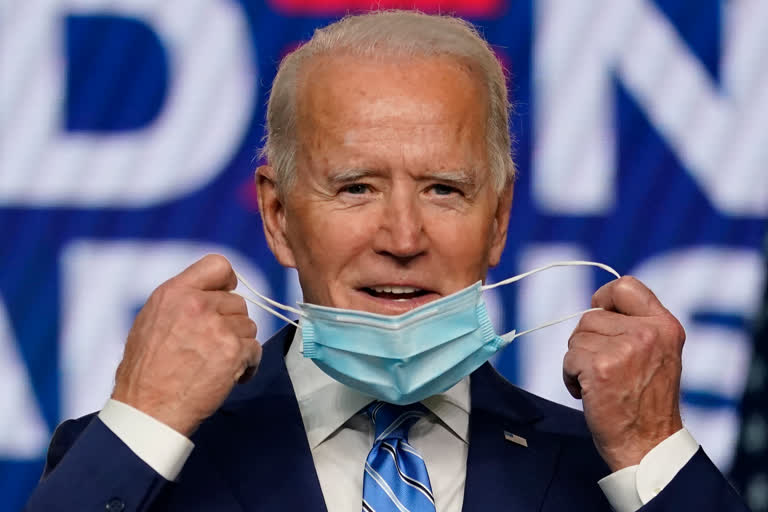Washington: Democrat Joe Biden was pushing closer to the 270 Electoral College votes needed to carry the White House, securing victories in the 'blue wall' battlegrounds of Wisconsin and Michigan, and narrowing President Donald Trump's path.
With just a handful of states still up for grabs, Trump tried to press his case in court in some key swing states, It was unclear if any of his campaign's legal maneuvering over balloting would succeed in shifting the race in his favour.
Two days after Election Day, neither candidate had amassed the votes needed to win the White House. But Biden’s victories in the Great Lakes states left him at 264, meaning he was one battleground state away — any would do — from becoming president-elect.
Trump, with 214 electoral votes, faced a much higher hurdle. To reach 270, he needed to claim all four remaining battlegrounds: Pennsylvania, North Carolina, Georgia and Nevada.
With millions of votes yet to be tabulated, Biden already had received more than 71 million votes, the most in history. At an afternoon news conference Wednesday, the former vice president said he expected to win the presidency but stopped short of outright declaring victory.
“I will govern as an American president,” Biden said. ”There will be no red states and blue states when we win. Just the United States of America.”
It was a stark contrast to the approach of Trump, who early Wednesday morning falsely claimed that he had won the election.
Trump’s campaign engaged in a flurry of legal activity to try to improve the president's chances and cast doubt on the election results, requesting a recount in Wisconsin and filing lawsuits in Pennsylvania, Michigan and Georgia. Statewide recounts in Wisconsin have historically changed the vote tally by only a few hundred votes; Biden led by more than 20,000 ballots out of nearly 3.3 million counted.
For four years, Democrats have been haunted by the crumbling of the blue wall, the trio of Great Lakes states — Michigan, Wisconsin and Pennsylvania — that their candidates had been able to count on every four years. But Trump’s populist appeal struck a chord with white working-class voters and he captured all three in 2016 by a combined total of just 77,000 votes.
Read more:I will govern as an American president: Biden stakes claim to White House
The candidates waged a fierce fight for the states this year, with Biden’s everyman political persona resonating in blue-collar towns while his campaign also pushed to increase turnout among Black voters in cities like Detroit and Milwaukee.
It was unclear when a national winner would be determined after a long, bitter campaign dominated by the coronavirus and its effects on Americans and the national economy. But even as Biden's prospects improved, the US on Wednesday set another record for daily confirmed coronavirus cases as several states posted all-time highs. The pandemic has killed more than 232,000 Americans.
Trump spent much of Wednesday in the White House residence, huddling with advisers and fuming at media coverage showing his Democratic rival picking up battlegrounds. Trump used his Twitter feed to falsely claim victory in several key states and amplify unsubstantiated conspiracy theories about Democratic gains as absentee and early votes were tabulated.
Trump campaign manager Bill Stepien said the president would formally request a Wisconsin recount, citing “irregularities” in several counties. And the campaign said it was filing suit in Michigan and Pennsylvania to halt ballot counting on grounds that it wasn’t given proper access to observe. Still, more legal action was launched in Georgia.
